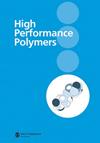耐超高温RTM双马来酰亚胺树脂的固化行为与性能
IF 1.6
4区 化学
Q3 POLYMER SCIENCE
引用次数: 0
摘要
系统地研究了一种低粘度、耐超高温的RTM双马来酰亚胺树脂的固化动力学和流变性能,以及固化树脂的热力学性能。采用差示扫描量热法(DSC)研究了不同加热速率下的热固化动力学。DSC曲线在150 ~ 300℃的温度范围内呈现固化状态,放热峰随升温速率从194℃移至231℃。固化反应的表观活化能为78.2 kJ/mol。用旋转粘度计对其非等温粘度和等温粘度的变化进行了研究。试验结果表明,RTM树脂在90℃~ 200℃范围内具有较宽的成型温度窗,在110℃下成型275 min时间长,流动粘度小于1000 mpa。建立了双arrhenius模型,对不同恒温条件下的粘度特性进行了预测,结果与实验数据吻合较好。设计了4个固化循环,获得了具有不同微观组织的固化网络,并利用动态力学分析(DMA)和万能材料试验机对不同固化循环下固化树脂的热力学性能进行了表征。结果表明,在250℃下固化10 h后,固化产物具有373.5℃的超高玻璃化转变温度和145.4 MPa的较大抗弯强度。本文章由计算机程序翻译,如有差异,请以英文原文为准。
Curing behavior and properties of ultra-high temperature resistant RTM bismaleimide resin
The properties of a RTM bismaleimide resin with low viscosity and ultra-high temperature resistance were systematically investigated, including its curing kinetics and rheological properties, and the thermal and mechanical properties of its cured resins. The thermal curing kinetics was investigated by differential scanning calorimetry (DSC) method with multiple heating rates. DSC curves display a cure regime in the temperature range of 150∼300°C and the exothermic peaks shift from 194°C to 231°C with heating rate. The apparent activation energy of curing reaction is calculated as 78.2 kJ/mol. The rheological properties were studied in terms of the changes of the non-isothermal and isothermal viscosity tested using a rotary viscometer. The test results show that the RTM resin has a wide molding temperature window from 90°C to 200°C and long molding time at 110°C for 275 min with a flow viscosity less than 1000 mPas. Dual-Arrhenius model was established to predict the viscosity characteristics at different constant temperatures, showing a good agreement with the experimental data. Four curing cycles were designed to obtain cured networks with different microstructures, and the thermal and mechanical properties of the cured resins suffered from various curing cycles were characterized by dynamic mechanical analysis (DMA) and universal material testing machine. The results exhibit that the cured product has a ultra-high glass transition temperature of 373.5°C and larger flexural strength of 145.4 MPa after post-curing at 250°C for 10 h.
求助全文
通过发布文献求助,成功后即可免费获取论文全文。
去求助
来源期刊

High Performance Polymers
化学-高分子科学
CiteScore
4.20
自引率
14.30%
发文量
106
审稿时长
1.2 months
期刊介绍:
Health Services Management Research (HSMR) is an authoritative international peer-reviewed journal which publishes theoretically and empirically rigorous research on questions of enduring interest to health-care organizations and systems throughout the world. Examining the real issues confronting health services management, it provides an independent view and cutting edge evidence-based research to guide policy-making and management decision-making. HSMR aims to be a forum serving an international community of academics and researchers on the one hand and healthcare managers, executives, policymakers and clinicians and all health professionals on the other. HSMR wants to make a substantial contribution to both research and managerial practice, with particular emphasis placed on publishing studies which offer actionable findings and on promoting knowledge mobilisation toward theoretical advances. All papers are expected to be of interest and relevance to an international audience. HSMR aims at enhance communication between academics and practitioners concerned with developing, implementing, and analysing health management issues, reforms and innovations primarily in European health systems and in all countries with developed health systems. Papers can report research undertaken in a single country, but they need to locate and explain their findings in an international context, and in international literature.
 求助内容:
求助内容: 应助结果提醒方式:
应助结果提醒方式:


